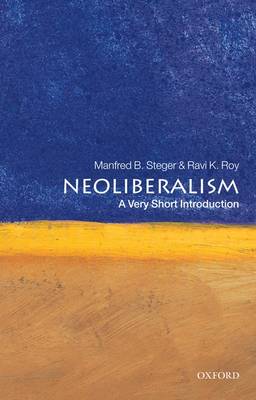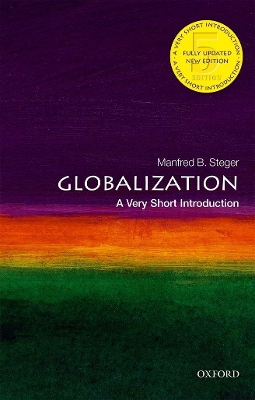Very Short Introductions
3 total works
Neoliberalism: A Very Short Introduction
by Manfred B. Steger and Ravi K Roy
Published 1 January 2010
Anchored in the principles of the free-market economics, 'neoliberalism' has been associated with such different political leaders as Ronald Reagan, Margaret Thatcher, Bill Clinton, Tony Blair, Augusto Pinochet, and Junichiro Koizumi.
In its heyday during the late 1990s, neoliberalism emerged as the world's dominant economic paradigm stretching from the Anglo-American heartlands of capitalism to the former communist bloc all the way to the developing regions of the global South. At the dawn of the new century, however, neoliberalism has been discredited as the global economy, built on its principles, has been shaken to its core by a financial calamity not seen since the dark years of the 1930s.
So is neoliberalism doomed or will it regain its former glory? Will reform-minded G-20 leaders embark on a genuine new course or try to claw their way back to the neoliberal glory days of the Roaring Nineties? Is there a viable alternative to neoliberalism?
Exploring the origins, core claims, and considerable variations of neoliberalism, this Very Short Introduction offers a concise and accessible introduction to one of the most debated 'isms' of our time.
ABOUT THE SERIES: The Very Short Introductions series from Oxford University Press contains hundreds of titles in almost every subject area. These pocket-sized books are the perfect way to get ahead in a new subject quickly. Our expert authors combine facts, analysis, perspective, new ideas, and enthusiasm to make interesting and challenging topics highly readable.
In its heyday during the late 1990s, neoliberalism emerged as the world's dominant economic paradigm stretching from the Anglo-American heartlands of capitalism to the former communist bloc all the way to the developing regions of the global South. At the dawn of the new century, however, neoliberalism has been discredited as the global economy, built on its principles, has been shaken to its core by a financial calamity not seen since the dark years of the 1930s.
So is neoliberalism doomed or will it regain its former glory? Will reform-minded G-20 leaders embark on a genuine new course or try to claw their way back to the neoliberal glory days of the Roaring Nineties? Is there a viable alternative to neoliberalism?
Exploring the origins, core claims, and considerable variations of neoliberalism, this Very Short Introduction offers a concise and accessible introduction to one of the most debated 'isms' of our time.
ABOUT THE SERIES: The Very Short Introductions series from Oxford University Press contains hundreds of titles in almost every subject area. These pocket-sized books are the perfect way to get ahead in a new subject quickly. Our expert authors combine facts, analysis, perspective, new ideas, and enthusiasm to make interesting and challenging topics highly readable.
We live today in an interconnected world in which ordinary people can became instant online celebrities to fans thousands of miles away, in which religious leaders can influence millions globally, in which humans are altering the climate and environment, and in which complex social forces intersect across continents. This is globalization.
In the fifth edition of his bestselling Very Short Introduction Manfred B. Steger considers the major dimensions of globalization: economic, political, cultural, ideological, and ecological. He looks at its causes and effects, and engages with the hotly contested question of whether globalization is, ultimately, a good or a bad thing. From climate change to the Ebola virus, Donald Trump to Twitter, trade wars to China's growing global profile, Steger explores today's unprecedented
levels of planetary integration as well as the recent challenges posed by resurgent national populism.
ABOUT THE SERIES:
The Very Short Introductions series from Oxford University Press contains hundreds of titles in almost every subject area. These pocket-sized books are the perfect way to get ahead in a new subject quickly. Our expert authors combine facts, analysis, perspective, new ideas, and enthusiasm to make interesting and challenging topics highly readable.
In the fifth edition of his bestselling Very Short Introduction Manfred B. Steger considers the major dimensions of globalization: economic, political, cultural, ideological, and ecological. He looks at its causes and effects, and engages with the hotly contested question of whether globalization is, ultimately, a good or a bad thing. From climate change to the Ebola virus, Donald Trump to Twitter, trade wars to China's growing global profile, Steger explores today's unprecedented
levels of planetary integration as well as the recent challenges posed by resurgent national populism.
ABOUT THE SERIES:
The Very Short Introductions series from Oxford University Press contains hundreds of titles in almost every subject area. These pocket-sized books are the perfect way to get ahead in a new subject quickly. Our expert authors combine facts, analysis, perspective, new ideas, and enthusiasm to make interesting and challenging topics highly readable.
Public Administration: A Very Short Introduction
by Stella Z. Theodoulou and Ravi K Roy
Published 25 August 2016
Public administration ensures the development and delivery of the essential public services required for sustaining modern civilization. Covering areas from public safety and social welfare to transportation and education, the services provided through the public sector are inextricably part of our daily lives. However, mandatory budgetary cuts in recent years have caused public administrators to radically re-think how they govern in the modern age.
In this Very Short Introduction Stella Theodoulou and Ravi Roy offer practical insight into the major challenges confronting the public sector in the globalized era. Tackling some of the most hotly debated issues of our time, including the privatization of public services and government surveillance, they take the reader on a global journey through history to examine the origins, development, and continued evolution of public administration.
ABOUT THE SERIES: The Very Short Introductions series from Oxford University Press contains hundreds of titles in almost every subject area. These pocket-sized books are the perfect way to get ahead in a new subject quickly. Our expert authors combine facts, analysis, perspective, new ideas, and enthusiasm to make interesting and challenging topics highly readable.
In this Very Short Introduction Stella Theodoulou and Ravi Roy offer practical insight into the major challenges confronting the public sector in the globalized era. Tackling some of the most hotly debated issues of our time, including the privatization of public services and government surveillance, they take the reader on a global journey through history to examine the origins, development, and continued evolution of public administration.
ABOUT THE SERIES: The Very Short Introductions series from Oxford University Press contains hundreds of titles in almost every subject area. These pocket-sized books are the perfect way to get ahead in a new subject quickly. Our expert authors combine facts, analysis, perspective, new ideas, and enthusiasm to make interesting and challenging topics highly readable.


